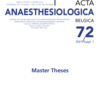Quality of life after COVID-19 induced critical illness: do the old survivors suffer more?
COVID-19; frailty; intensive care units; quality of life
Published online: Apr 21 2022
Abstract
Objective: During the first wave of the COVID-19 epidemic in Belgium, major concern existed regarding bed and nurse capacity to care for all ICU eligible patients. Since age is linked with increased comorbidity and potentially decreased quality of life, physicians may be reluctant to allocate scarce ICU beds to the elderly patients. However, we believe elderly patients with good premorbid quality of life can have sufficient quality of life after COVID-19 associated critical illness.
Methods: We retrospectively analyzed all 97 patients who were admitted to the ICU for severe COVID-19 induced respiratory failure from March 13th until June 20th 2020. Electronic patient files were queried for baseline characteristics and ventilation strategy. Data on outcome were collected in collaboration with our post-intensive care clinic. In this clinic, patients were contacted 8 to 12 weeks after discharge to screen for symptoms of the post-intensive care syndrome.
Results: Despite increased comorbidities in elderly patients, admission frailty scores were similar amongst all age groups. Mortality was higher in the elderly patient groups. Patients experienced a drop in self-reported quality of life after ICU admission. However, after dichotomization based on the age of 70 years old, the change in self-reported quality of life in the elderly does not appear to be significantly bigger than in younger patients.
Conclusion: Despite higher mortality rates in the elderly patient admitted to the ICU due to COVID-19 induced respiratory failure, the drop in self-reported quality of life is not affected by age. As such, ICU clinicians should look beyond crude ICU mortality and consider utilizing premorbid self-reported quality of life and frailty scores to estimate whether ICU admission adds value to the individual patients life.
